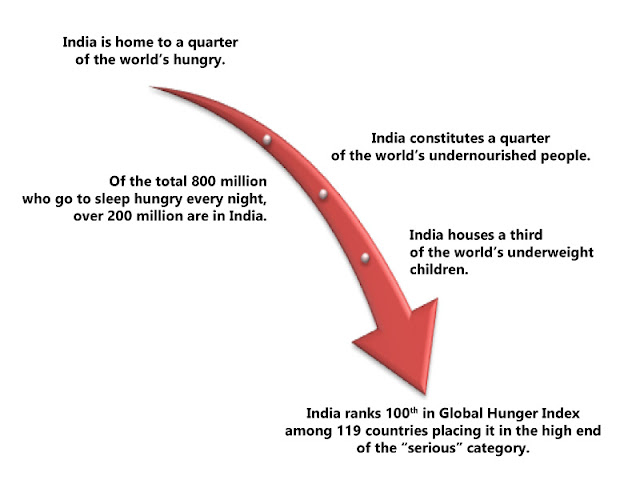“Indians waste as much food as the whole of United Kingdom consumes”, cites CSR journal. Not a pretty picture for a country where millions go hungry, every day. The deplorable hunger condition in India can be gauged from the below facts:
In addition, according to the FAO’s (Food and Agricultural Organisation of the United Nations) estimates in ‘The State of Food Security and Nutrition in the World, 2017” report, India is home to the largest undernourished population in the world with:
While the country is battling these statistics, spending capacity and consumption trends among consumers have only worsened the hunger scenario. Despite being in such a critical state where India cannot afford to waste any food, it is reported that Rs. 88,800 crores worth of food wasted in India per year. Apart from ‘food loss’ i.e. wastage of raw food products during harvest, storage or in transit, mainly due to inadequate and disorganised infrastructure and supply chain, ‘food waste’ i.e. wastage of food at the consumer level. Below are some of the areas that contribute to maximum food wastage:
And, ironically, India is home to both ‘food waste’ and ‘food loss’!
However, kudos to the several organisations that have directed all their efforts towards countering the prevalent hunger situation. One such organisation is The Akshaya Patra Foundation, an Indian charitable trust serving mid-day meals at government schools. The main inspiration to establish this Foundation came from a heartfelt incident many years ago. One day, during a visit to Mayapur, a village near Calcutta, His Divine Grace A. C. Bhaktivedanta Swami Prabhupada saw a group of children fighting with stray dogs over scraps of food. This incidence left Srila Prabhupada immensely disturbed, and he set forth a resolve that no child within a radius of ten miles from our centre should go hungry. This motivating and determined resolution led to the establishment of Akshaya Patra in June 2000 with the core objective to feed the children so that they get nourishment and education too.
Initially, the Foundation served cooked meals to just 1,500 children in five government schools of Bangalore. This Indian charitable trust is cognizant of the importance of food in the lives of people, especially children. Hence, to maximise the potential of the school lunch programme, it employs state-of-the-art kitchens, innovative technology, and smart engineering to cook and deliver nutritious and hygienic meals to each school on each working day. The Foundation operates centralised kitchens in urban and semi-urban regions and decentralised kitchens in remote areas. The centralised kitchens are highly mechanised units with the capacity to cook up to 100,000 meals, whereas decentralised kitchens are smaller units operated by Self-Help Groups under the supervision of Akshaya Patra’s kitchen in-charges and catering to a group of schools in a particular area.
It is imperative that such large-scale cooking requires a lot of planning and structured processes so that neither raw materials nor cooked meals reach the trash bin. Hence, Akshaya Patra mandatorily follows some standard operating processes such as:
The above-mentioned measures have helped Akshaya Patra combat food wastage in its purview of operations. And, by doing so, this Indian charitable trust is making nutrition-rich food available to over 1.6 million children on every school day. So that this NGO can multiply its reach, it has made the online donation for charity available to all for easy and safe transactions. Every contribution towards this NGO will be directed and utilised in ensuring food security for children through regular school meals. Additionally, this lunch will support children in continuing school, concentrating better in their lessons, and participating actively in co-curricular activities such as sports and cultural.
Needless to say, if we can contain food wastage, it will benefit many millions of lives, not just in India but globally too. It is estimated that if we can save one-fourth of the food that is currently being wasted globally then we will have enough to feed 870 million hungry people in the world which also includes the 194.6 million hungry people in India. The concern of food wastage is so critical that it receives a clear mention in the Sustainable Development Goal 12.3 stating, “By 2030, halve per capita global food waste at the retail and consumer levels and reduce food losses along production and supply chains, including post-harvest losses.” Hence, when there is adequate food production, and availability of advanced technologies for harvesting, storing and disbursing food products, than the onus lies on us to ensure that every citizen avails the right to food, and every child is nourished and healthy.
















0 comments:
Post a Comment